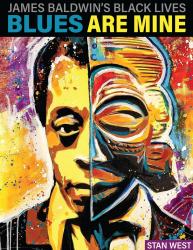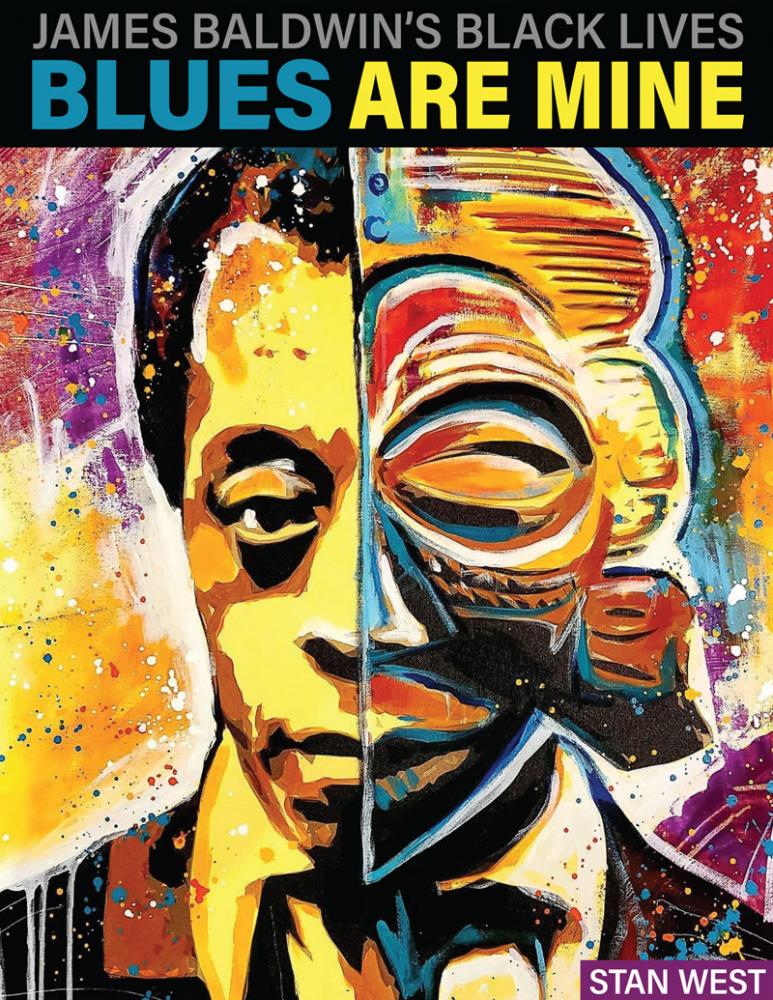James Baldwin's Black Lives Blues Are Mine
Author(s): Stan West
Edition: 1
Copyright: 2021
Pages: 142
Choose Your Platform | Help Me Choose
Hear a sample read by author Stan West!
“Using creative nonfiction and lots of research data, I wrote a two-track narrative about 20th century’s best essayist,” said author Stan West. “The relevance and timeliness of this research and its implications in policy, literature and news seems to be embedded in today’s headlines.”
The public story is how the late great gay African-American writer James Baldwin wrote about police brutality in the 20th century while living in self-imposed exile in France. “The private story is how he might want me – a global Black journalist -- to write about police misconduct now during this viral, financial, racial reckoning through the lens of my straight, gay & trans family.
“I met Baldwin in ’86 a year before he died. While praising his terse verse I inquired why many Whites thought he was too angry & some Blacks said he was not angry enough. Perturbed that I disturbed his ambivalence he said, ‘Show me a Black who’s not angry, and I’ll show you a fool nigga who’s lost!’ This internal struggle is one he often wrote about. Duality would later drive his books, plays and films inspired by his wise words. Better than most, Baldwin highlights the double consciousness writers of color have. That gave him the blues. It gives me the blues, too.”
Introduction
Retreat #1 (Columbus, Ohio)
Back to Babylon: Part 1
Retreat #2 (Chicago, Illinois)
Ramona
Cities (including Chi-Town) Erupt
Childhood Male Retreats
Male In-Law Retreats
Selma Guys Gathering
Knights Gathering
Retreat #3 (Berlin)
Retreat #4 (Columbus, Ohio)
Milan Male Refugee Retreat
Baldwin Conference (Paris)
Rose Jourdain on Baldwin
Amman and I in Baldwin’s France
Jordan and I in Hemingway’s Spain
The Kids and I Reflect on Living Abroad
Back to Babylon: Part 2
Baldwin’s “I Am Not Your Negro”
My Early Reporting
Thesis Statement on Me and Baldwin
Retreat #5 (Kelvin killed-Columbus, Ohio)
Conclusion
Once in a blue moon a reader has the opportunity of a personal encounter with a seminal work that will survive and be relevant for the ages, a cultural jewel coming out at the precise historical moment. This is the case with Stan’s West: James Baldwin’s Black Lives Blues Are Mine. This book shows a probing scholar with his hand firmly but gently on the pulse of cultural formations that have eluded most. Stan West explores the complexities of the Black Lives Matter Movement, using James Baldwin’s as a premise. His writing is intimate, poetic at times, inclusive of gender and racial diversity issues with both sociological depth and a keen ear for African American social cadences and political innovations in the twenty-first century.
The eloquence of his style educates the reader, any reader, on the interplay of continuity and the means for transformation, on heritage and innovation, on roots and fusion of Black Lives Culture. West highlights the rich complexities and fertile spaces of African American Identity. Based on the blows of racism, elitism, sexism, cultural chauvinism, and all the other forms of prejudice that African Americans encounter in daily life, this book is needed because there is very little creative non-fiction about men of color by men of color for the benefit of us all!
Film studies and journalism, the author expertise, are masterfully linked with historical continuities, such as James Baldwin’s: I’m Not Your Negro, movements, such as the Black Panthers, the U.S. based Occupy Movement and the Black Lives Matter Movement, sprung in the United States, but with a strong international presence, alerting us to open up to cultural debates on anger.
Cleverly the author warns us,
this book is my memoir about how the male, female, and transsexual family members coped with socio/racial/gender micro and macroaggressions from dominant ideology. James Baldwin’s Black Lives Blues Are Mine is the motif.
I have used the word cleverly because he also made clear something that the commercial media and the dominant story of Black Lives Matter tend to leave out: that African Americans were involved in this and other forms of activism from the beginning of the forced migration, and that their practices and traditions are woven into the very fabric of the American Black family experience in all its subsequent manifestations.
I am honored to write this review of Stan West’s James Baldwin’s Black Lives Blues Are Mine, for it has brought to me smiles and tears, something very akin with an embrace in this perilous times. The book is inspiring. The thoughts provoked by family stories are lively, dynamic, straight from the heart, and of outmost importance for African American men and for the society at large. The aim is an open, stimulating, and rich gender/inclusive environment for men, women, and the LGTBQ community. The kind of literary environment were all will feel free to ponder the important questions of Black Lives culture and identity.
I am certain that this book will endure, not just, for the captivating anecdotal writing touching on the themes of our own days; but because, it will serve as an active force in the challenging social struggles ahead, and as a companion force for the construction of an alternative ethos of Black Lives, from Black family lives in the United States to Black family lives and social consciousness worldwide.
Dr. Juana Iris Goergen, DePaul University
InterAmerican University, Puerto Rico
Hear a sample read by author Stan West!
“Using creative nonfiction and lots of research data, I wrote a two-track narrative about 20th century’s best essayist,” said author Stan West. “The relevance and timeliness of this research and its implications in policy, literature and news seems to be embedded in today’s headlines.”
The public story is how the late great gay African-American writer James Baldwin wrote about police brutality in the 20th century while living in self-imposed exile in France. “The private story is how he might want me – a global Black journalist -- to write about police misconduct now during this viral, financial, racial reckoning through the lens of my straight, gay & trans family.
“I met Baldwin in ’86 a year before he died. While praising his terse verse I inquired why many Whites thought he was too angry & some Blacks said he was not angry enough. Perturbed that I disturbed his ambivalence he said, ‘Show me a Black who’s not angry, and I’ll show you a fool nigga who’s lost!’ This internal struggle is one he often wrote about. Duality would later drive his books, plays and films inspired by his wise words. Better than most, Baldwin highlights the double consciousness writers of color have. That gave him the blues. It gives me the blues, too.”
Introduction
Retreat #1 (Columbus, Ohio)
Back to Babylon: Part 1
Retreat #2 (Chicago, Illinois)
Ramona
Cities (including Chi-Town) Erupt
Childhood Male Retreats
Male In-Law Retreats
Selma Guys Gathering
Knights Gathering
Retreat #3 (Berlin)
Retreat #4 (Columbus, Ohio)
Milan Male Refugee Retreat
Baldwin Conference (Paris)
Rose Jourdain on Baldwin
Amman and I in Baldwin’s France
Jordan and I in Hemingway’s Spain
The Kids and I Reflect on Living Abroad
Back to Babylon: Part 2
Baldwin’s “I Am Not Your Negro”
My Early Reporting
Thesis Statement on Me and Baldwin
Retreat #5 (Kelvin killed-Columbus, Ohio)
Conclusion
Once in a blue moon a reader has the opportunity of a personal encounter with a seminal work that will survive and be relevant for the ages, a cultural jewel coming out at the precise historical moment. This is the case with Stan’s West: James Baldwin’s Black Lives Blues Are Mine. This book shows a probing scholar with his hand firmly but gently on the pulse of cultural formations that have eluded most. Stan West explores the complexities of the Black Lives Matter Movement, using James Baldwin’s as a premise. His writing is intimate, poetic at times, inclusive of gender and racial diversity issues with both sociological depth and a keen ear for African American social cadences and political innovations in the twenty-first century.
The eloquence of his style educates the reader, any reader, on the interplay of continuity and the means for transformation, on heritage and innovation, on roots and fusion of Black Lives Culture. West highlights the rich complexities and fertile spaces of African American Identity. Based on the blows of racism, elitism, sexism, cultural chauvinism, and all the other forms of prejudice that African Americans encounter in daily life, this book is needed because there is very little creative non-fiction about men of color by men of color for the benefit of us all!
Film studies and journalism, the author expertise, are masterfully linked with historical continuities, such as James Baldwin’s: I’m Not Your Negro, movements, such as the Black Panthers, the U.S. based Occupy Movement and the Black Lives Matter Movement, sprung in the United States, but with a strong international presence, alerting us to open up to cultural debates on anger.
Cleverly the author warns us,
this book is my memoir about how the male, female, and transsexual family members coped with socio/racial/gender micro and macroaggressions from dominant ideology. James Baldwin’s Black Lives Blues Are Mine is the motif.
I have used the word cleverly because he also made clear something that the commercial media and the dominant story of Black Lives Matter tend to leave out: that African Americans were involved in this and other forms of activism from the beginning of the forced migration, and that their practices and traditions are woven into the very fabric of the American Black family experience in all its subsequent manifestations.
I am honored to write this review of Stan West’s James Baldwin’s Black Lives Blues Are Mine, for it has brought to me smiles and tears, something very akin with an embrace in this perilous times. The book is inspiring. The thoughts provoked by family stories are lively, dynamic, straight from the heart, and of outmost importance for African American men and for the society at large. The aim is an open, stimulating, and rich gender/inclusive environment for men, women, and the LGTBQ community. The kind of literary environment were all will feel free to ponder the important questions of Black Lives culture and identity.
I am certain that this book will endure, not just, for the captivating anecdotal writing touching on the themes of our own days; but because, it will serve as an active force in the challenging social struggles ahead, and as a companion force for the construction of an alternative ethos of Black Lives, from Black family lives in the United States to Black family lives and social consciousness worldwide.
Dr. Juana Iris Goergen, DePaul University
InterAmerican University, Puerto Rico



